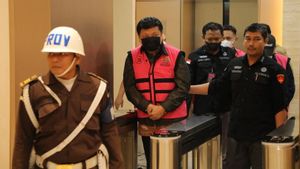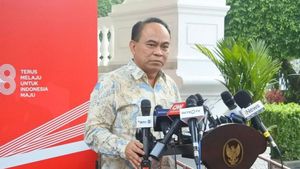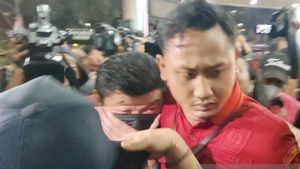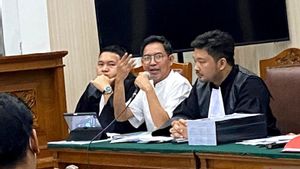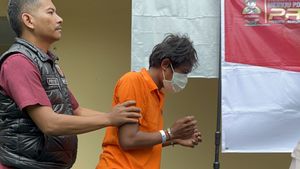JAKARTA - The Coordinating Minister for Political, Legal and Security Affairs (Menko Polhukam) Mahfud MD touched on the issue of money politics in the regional head elections. This year, a number of regions will hold regional elections.
For Mahfud, money politics is not a new thing, because it happened when a regional head candidate was elected by the DPRD which happened during the New Order. Now, the pattern of money politics has changed because the system has also changed. This practice is now being carried out not to the DPRD, but to the party leadership. Giving money to party leaders, said Mahfud, is a political dowry.
"In the past, money politics in the regional head election was in the DPRD, now it has moved to the party leadership. Don't pay to the DPRD, pay to the party, the dowry is the name. in the newspaper, "said Mahfud in his remarks at the event held at the Grand Paragon Hotel, West Jakarta, Monday, February 24.
He also hopes that this pattern will no longer exist. "Let's now find a new balance," he said.
It is known, the practice of political dowry often occurs just before general elections, especially regional head elections and legislative elections. The motive is the same as what Mahfud said, those who fail to advance will open up about the practice of political dowry.
In 2018, for example, La Nyalla Mataliti said, there was a practice of dowry politics or money politics for Gerindra Party Chairman Prabowo Subianto to advance to the East Java Pilkada. La Nyalla said that Prabowo had asked if he was willing to pay Rp200 billion to obtain a permit to become a candidate for regional head.
"Because there are many Muslim businessmen behind me," said La Nyalla when explaining about the practice of political dowry that befell him in 2018.
In addition, the former Chairman of the PSSI also revealed that Prabowo had asked for money through the Chairman of the East Java Gerindra DPD, Supriyanto for Rp. 40 billion. The reason is that the money will be used as operational money. Although initially he admitted he was shocked and thought that the dowry issue was just a joke, Prabowo later asked for the money.
Later, La Nyalla's statement was lost and there was no continuation. Because, when he was summoned and would be examined by Bawaslu regarding his statement, La Nyalla was absent from time to time. In addition, he clarified that the Rp40 billion Prabowo requested was not a political dowry but only as witness funds.
The political dowry payment also blew up in the Hanura Party chaired by Oesman Sapta Odang. A party cadre from Papua, Yan Mandenas, admitted that he was asked for money to become a candidate for Regent of Biak Numfor. He claimed to have evidence of his communication with a Hanura administrator. Yan also met with OSO and was asked for a dowry of Rp.350 million for one chair.
Later, Yan failed to run as a candidate for Regent of Biak Numfor. Meanwhile, OSO said that political dowry is actually legitimate if it goes into the party treasury, not into personal pockets.
"Political dowry is if there is a party mechanism, that's fine, but you have to enter the party, you can't enter your own pocket. That is haram," said OSO when asked for his response to the issue of political dowry in his party.
An open secret that keeps repeating itself
Money politics, which has shifted to become a political dowry, according to a political observer from LIPI Aisyah Putri Budiarti (Puput) is an open secret that often recurs every time an election will be held.
This political dowry is usually given so that the candidate gets the blessing of the chairman of the political party to advance in the election. Because, at this time, the people determine whether the regional head candidates are elected or not.
As a result, now the process of giving dowries is being carried out for the general chairperson of political parties with the aim that candidates can advance in both regional and legislative elections. However, Puput said, not all parties applied political dowry.
"It cannot be assimilated that this political dowry must occur in every Pilkada or Pileg event. There may be exceptions, where there are also candidates whose capacity and popularity are chosen by the party to be supported without any dowry," said Puput. , February 24th.
Even though this practice continues, Puput assesses that the giving of political dowry or the practice of money politics can actually be stopped if there is the will of all parties. Including political parties as vehicles for candidates who will compete in the regional elections.
He said, there are several ways to stop the emergence of political dowries. Among other things, giving a gap of 2.5 years for elections at the national and regional levels.
"The goal is that there is a suit effect between parties and candidates in the presidential and regional elections. In addition, there is a reward effect - rewards - for good parties, regional heads, and presidents and punishment for bad ones," said Puput while adding this practice. can provide motivation for parties to elect candidates for regional heads who are able to work and not only rely on political dowries to advance.
Apart from the 2.5-year gap, he also assessed that the government should begin to facilitate opportunities for independent candidacy in general elections. The goal is to increase capacity-based competition. If this is the case, then parties inevitably choose their best candidate to compete and win. Thus, the potential for political dowry is reduced.
Finally, Puput considered, there must be strict sanctions related to political dowry transactions. According to him, political dowries are often hidden by parties as witness funds. In fact, these funds are not regulated by internal party standards.
"Therefore, in the future there needs to be clear rules to interpret the issue of political dowry. So that then it can be categorized as an act against the law in order to suppress the practice," he said.
The English, Chinese, Japanese, Arabic, and French versions are automatically generated by the AI. So there may still be inaccuracies in translating, please always see Indonesian as our main language. (system supported by DigitalSiber.id)








